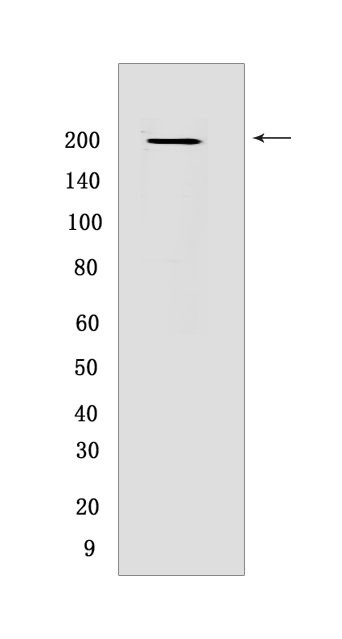ERCC5 Mouse mAb[J60Z]Cat NO.: A71527
Western blot(SDS PAGE) analysis of extracts from HT-29 cells.Using ERCC5 Mouse mAb IgG [J60Z] at dilution of 1:1000 incubated at 4℃ over night.
Product information
Protein names :ERCC5,ERCM2,XPG,XPGC,ERCC5_HUMAN,DNA excision repair protein ERCC-5
UniProtID :P28715
MASS(da) :133,108
MW(kDa) :200kDa
Form :Liquid
Purification :Protein A purification
Host :Mouse
Isotype :IgG
sensitivity :Endogenous
Reactivity :Human
- ApplicationDilution
- 免疫印迹(WB)1:1000-2000
- The optimal dilutions should be determined by the end user
Specificity :Antibody is produced by immunizing animals with a synthetic peptide of human ERCC5.
Storage :Antibody store in 10 mM PBS, 0.5mg/ml BSA, 50% glycerol. Shipped at 4°C. Store at-20°C or -80°C. Products are valid for one natural year of receipt.Avoid repeated freeze / thaw cycles.
WB Positive detected :HT-29 cells
Function : Single-stranded structure-specific DNA endonuclease involved in DNA excision repair (PubMed:8206890, PubMed:8090225, PubMed:8078765, PubMed:7651464, PubMed:32821917, PubMed:32522879). Makes the 3'incision in DNA nucleotide excision repair (NER) (PubMed:8090225, PubMed:8078765, PubMed:32821917, PubMed:32522879). Binds and bends DNA repair bubble substrate and breaks base stacking at the single-strand/double-strand DNA junction of the DNA bubble (PubMed:32522879). Plays a role in base excision repair (BER) by promoting the binding of DNA glycosylase NTHL1 to its substrate and increasing NTHL1 catalytic activity that removes oxidized pyrimidines from DNA (PubMed:9927729). Involved in transcription-coupled nucleotide excision repair (TCR) which allows RNA polymerase II-blocking lesions to be rapidly removed from the transcribed strand of active genes (PubMed:16246722). Functions during the initial step of TCR in cooperation with ERCC6/CSB to recognized stalled RNA polymerase II (PubMed:16246722). Also, stimulates ERCC6/CSB binding to the DNA repair bubble and ERCC6/CSB ATPase activity (PubMed:16246722). Required for DNA replication fork maintenance and preservation of genomic stability (PubMed:26833090, PubMed:32522879). Involved in homologous recombination repair (HRR) induced by DNA replication stress by recruiting RAD51, BRCA2, and PALB2 to the damaged DNA site (PubMed:26833090). During HRR, binds to the replication fork with high specificity and stabilizes it (PubMed:32522879). Also, acts upstream of HRR, to promote the release of BRCA1 from DNA (PubMed:26833090)..
Subcellular locationi :Nucleus. Chromosome.
IMPORTANT: For western blots, incubate membrane with diluted primary antibody in 1% w/v BSA, 1X TBST at 4°C overnight.


